Following our open call, which ended 15 August, 2018, the Foundation received a total of 76 nominations. Of these, the statutory board has authorized 10 projects for support, based on the recommendations of the selection committee. The Foundation will support the selected associations, initiatives or individuals with a total sum of 700 000 CZK, each project receiving 70 000 CZK.
The selection process took place in two rounds. The Foundation’s statutory board was especially interested in the interdisciplinary and artistic aspects of the proposals, while emphasizing their pedagogical potential and focus on environmental issues as well.
The following projects were selected for the Foundation’s support:

8JINAK! (“8 Otherwise”) is a successful and progressive leisure-oriented, and politically non-aligned association which has been operating in Prague’s 8th district since 2011. The group’s focus is on topics such as the environment, city development plans and local alternative culture.
8JINAK! combines its activities with public debates about urbanism in the context of lower Libeň, while constantly exploring local cultural identity. The group also offers a fresh perspective on the legacy of a Karlín native, the photographer and experimental film maker Alexander (Hammid) Hackenschmied by means of lectures, thematic walks and audiovisual performances. One of the projects consists of preserving the visual memory of Prague 8 through the accumulation, digitization and subsequent re-use of analog film material thematically focused on the city.
Ferenc Futurist Neighborhood Club
The Ferenc Futurist Neighborhood Club was founded in 2011 at the initiative of a group of friends in Černošice who wanted to create a space for viewing art, and for supporting the overlapping spheres between the capital city and the local community.
For a long time, its founding members were dissatisfied with the cultural politics of the local municipality. And so, their yearly program presents selected artists and visiting projects, and also builds on educational and communal, neighborly activities. Thanks to the specific multi-national and multi-ethnic composition of this Prague suburb, we find an interesting mix of approaches and diversity in the club’s activities.
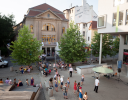
The Hraničář Society (Spolek Hraničář) is an artistic platform in Ústí nad Labem which connects contemporary art and culture with everyday life. It is composed of a rich and particularly well-rendered program, which the group stages in the building of the former Hraničář Cinema, and it caters to various social and age groups.
The society works with the local municipality, the University of Jan Evangelista Purkyně and other institutions, and currently supports a large part of the overall artistic activity in Ústí. The program articulates important current topics from the sphere of art and ecology, sustainable economics, and social issues. Their activities and cultural strategy have positively reflected on the overall communal atmosphere of the city, and the nature of the local public spaces.
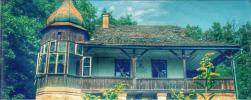
Krčkovna is a South Bohemian movement attempting to save and preserve the former restaurant, built in 1906 by Karel Fiala. The locality, which has much of historical value of at least a regional significance, is owned by the municipality, but even so, finds itself threatened by demolition.
The association has offered quite a viable solution, one which is attractive for the local community and sensitive to tradition. Their aim is to gradually repair the previous structure, and restore its original function as a recreational space, one which would be supported by a cultural program devoted to presenting the history of Blatná, of 20th-century architecture, and to present the works and life of the architect Karel Fiala. A rose garden will bloom on the surrounding property, which will be reminiscent of the rose cultivator Jan Böhm.
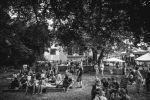
Since 2015, the Living Villa Society has been consistently working towards the cultural rejuvenation and sensible use of the unique spaces of the Kralova Villa in Prachatice. This “pearl of functionalist architecture” in Southern Bohemia has been threatened with demolition due to a problem created by a plan for road relocation.
The organizational team rented the Kralova villa from 2015 to 2017, and organized numerous cultural, educational and social events there, which had the positive impact of rejuvenating the community of Prachatice, and educating the community about the building’s architectural and historical value. After the lease was terminated, the association’s members have focused on commissioning an analysis of the city’s traffic situation which will, they hope, result in the cancelation of the planned roundabout.
The Offcity project has been on the scene a long time, devoting itself to art in public space, but also much more. They have been active in the Pardubice region since 2008, and originally focused on the popularization of art, architecture, urbanism and civic participation in the city and its environs.
Nowadays, the society organizes art residencies, initiates competitions in the creation of public art works, and prepares lectures and educational programs for the wider public. They attempt to integrate the local municipal representatives in an attempt to foster a continuous, open dialog between City Hall and the city’s residents. The association also nurtures the conditions for perceiving art and culture as a natural parts of people’s lives.
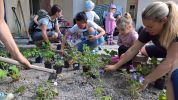
The Old School (Stará Škola) initiative comes directly from the natural needs of the local residents, and is built on the principle of volunteer work and community planning. The association has managed to repair the decrepit structure of a local school and successfully operate it for five years.
This takes place mostly in the club café, where a cultural program is regularly offered by local or affiliated artists, musicians and literary figures. The program is cross-generational by nature, and lectures organized by The University of the Third Age are planned alongside art courses for both young and old. The specific and substantial value of the whole project is the vibrant and functioning cooperation of the locals to co-create the program, as well as participate in the upkeep of the shared communal space, including taking care of the school garden.
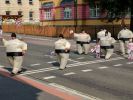
The Open Museum (Otevřené Muzeum) is a loose association consisting of local inhabitants, initiating year-round activities which aim to rejuvenate and “make present the genius loci” of the small Giant Mountain (Krkonoše) village of Horní Maršov.
The region, which had been significantly impacted by the forced post-war relocation of the German-speaking population of the former Sudetenland, has long suffered from population fluctuation, with a resulting indifference towards shared civic topics, upkeep of the local historical sites, and cultural and social life. The aim of the association is to foster a closer relationship of the inhabitants to their locale by means of locally-flavored artistic projects, in order to bring the locals together around shared activities and caring of for their public space. The group consists mostly of graduates from art schools, some of whom are also natives of the town.
Uutěrky (“At the Dish Towel”) is small graphic studio focused primarily on smaller projects and authorial illustration, in addition to other, wide-ranging artistic projects.
Based on their personal professional activities, Uutěrky focus part of the concept of its program on workshops, introducing invited guests to the local residents. Last year, the duo of Mjk and Fjk (Martin Krkošek and Pavla Byrtusová) began building the infrastructure for a community and cultural center. They successfully contacted the municipality representatives, who decided to support the project by renting out the municipally-owned former sawmill for a very small sum. The wide meadow around the saw mill will gradually be transformed into a community park, which will facilitate the organization of planned, open-air events. The final form of the park will be decided based on the outcome of discussions among the Návsí residents themselves.
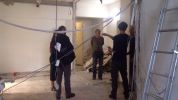
The Vašulka Kitchen Center for New Media is a well conceived and expertly formulated concept that builds on the legacy of two pioneers of video art and electronic media – Brno native Woody Vašulka and his wife Steina.
This new archival and experimental center will house, preserve and present the Vašulka video library and digital archive, and will also serve as an open space for supporting discussions on contemporary new media art. The aim of this collective is to foster a free and creative communication platform for the exchange of information and experience at an international level.